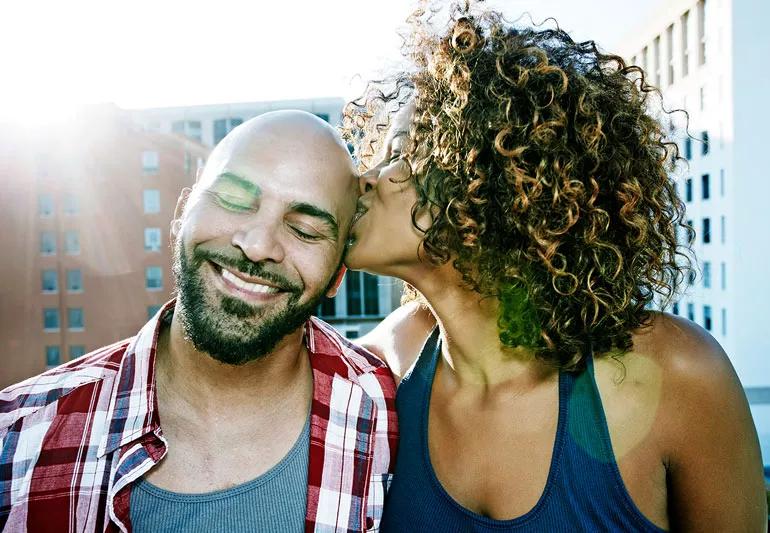Here's how you can tell if you're ready

Image content: This image is available to view online.
View image online (https://assets.clevelandclinic.org/transform/c42d8f01-7827-4e05-a9d3-d5c958e115d7/cancerDatingCouple-463013109_770x533_jpg)
A woman kissing a man on the head.
Dating comes with many challenges, especially if you’re battling cancer. No matter what stage you’re in with regard to treatment, it’s normal to have fears and concerns about dating or starting a new relationship. But having cancer doesn’t have to stop you from taking a chance on a great relationship.
Advertisement
Cleveland Clinic is a non-profit academic medical center. Advertising on our site helps support our mission. We do not endorse non-Cleveland Clinic products or services. Policy
First, understand you’re not alone in wondering how cancer will affect your personal life. According to oncology social worker Christa Poole, MSSA, LISW-S, OSW-C, there are a lot of common questions she sees people ask, such as “Should I start to date again? and “How do I tell someone I’m dating that I have cancer?”
It’s also common to hear, “What if my partner doesn’t want to date me because I have cancer?” or “How does cancer affect my mood or my body?”
If you have cancer, these questions not only create worry, but can also keep you from the friendship and companionship that dating provides, Poole says.
“There may be some unique challenges involved with dating when you have cancer,” she says. “While there are a few things someone with cancer may need consider when starting a new relationship, it’s, of course, still very possible to look forward to sharing a loving, caring relationship with someone,” she reassures.
Here are the things that can help you get there.
The unique challenges and struggles individuals with cancer face are real. These may include limited energy, fatigue, pain and emotional sensitivity.
“Expect them, but make sure you’re always mindful that they aren’t the only things that define you,” Poole says.
Advertisement
“Finding sources of support is so important and can lead to a great
outcome,” Poole says. Team up with your oncologist who can help answer questions and connect you with a social worker.
“There are so many support circles that match up cancer survivors with patients undergoing treatment,” she adds. “Be proactive in exploring what forms of support are available to you.”
Take time to recover from the cancer journey, and remember that the priority has to be you.
Surround yourself with close friends and family, and you will know when you feel ready to date. Be true to your own feelings, and know that they are all okay.
Try a new activity, hobby or take a fun class. These activities will help you meet new people and get comfortable being social while doing something you enjoy.
Let the things you enjoy be the driving force of your day, Poole says. “You can try a dating app, too, which might help you get out of your shell and feel comfortable getting to know someone first.”
Take some time and practice what you want to say in advance. Then, determine a good time to share information with the person you’re dating.
“Talking to other cancer survivors for support and advice who have just started dating or are in relationships is an excellent way for you to know what to expect. And it can prepare you for some of the things you might hear from the person you decide to share your journey with,” says Poole.
“Remember, everyone has different levels of strength, emotion and different ways of expressing empathy.”
Don’t automatically think that you’ll be rejected once someone finds out about your cancer.
Remember that although it can be awkward and difficult, being open and honest with your new dating partner can often help relieve stress and anxiety.
“Stay encouraged and keep your faith in other people,” Poole says. “You may be pleasantly surprised if you keep in mind that your cancer is not your only or predominant trait. It’s only a part of who you are, so trust that others know that, too.”
Advertisement

Sign up for our Health Essentials emails for expert guidance on nutrition, fitness, sleep, skin care and more.
Learn more about our editorial process.
Advertisement
Cancer is deadlier in racial and ethnic minority groups and for people in low-income areas
Thoughts and feelings can change over time; relaxation, self-care and support groups can help
One quarter of patients develop a brain tumor later
The cancer journey doesn’t end after treatment
7 tips to guide you through their treatment
Life after childhood cancer may look a little different
Most recommended precautions center around minimizing bruising or swelling
Type 2 diabetes isn’t inevitable with these dietary changes
Applying a hot or cold compress can help with pain
Pump up your iron intake with foods like tuna, tofu and turkey